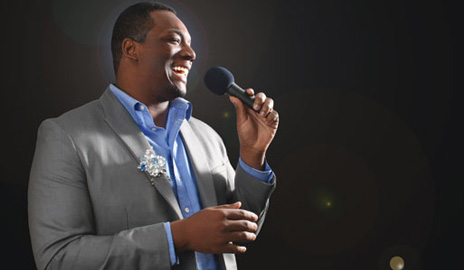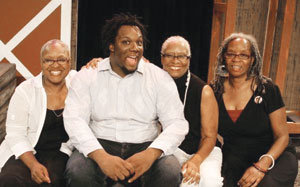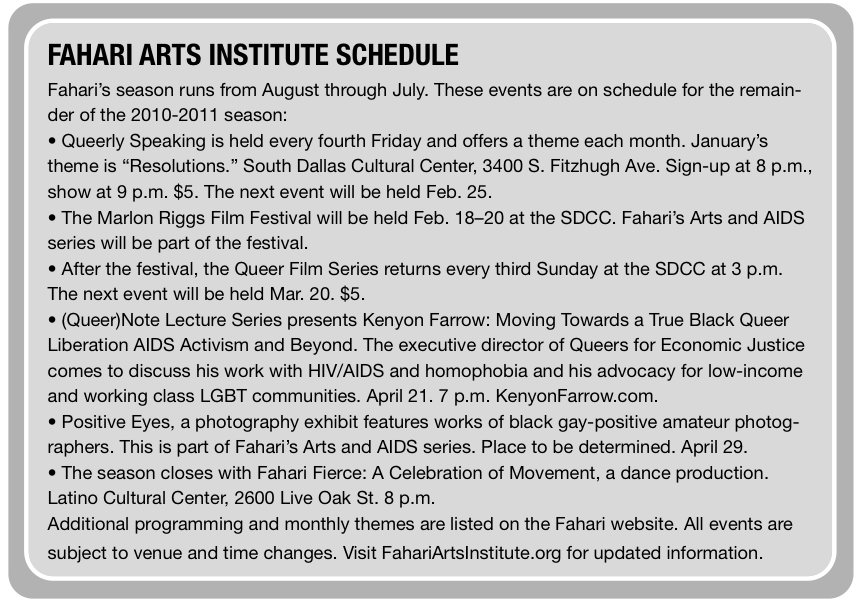Dallas’ black gay arts scene gets a future as Harold Steward refers to the past
RICH LOPEZ | Staff Writer
lopez@dallasvoice.com
Sometimes with death comes a birth — or maybe an outing.
When acclaimed author E. Lynn Harris died in the summer of 2009, Harold Steward, along with the rest of the gay black community and Harris’ fans, felt shock and sadness.
But with Harris’ death came the inception of an idea that is changing the face of arts in the Dallas African-American LGBT community.
“There had been nothing planned to memorialize him, so I approached View of Dallas [book club] about this idea,” Steward said. “I brought in the dance and poetry people while they read excerpts. We had about 30 people come … and Fahari was kinda outed at that point.”
Only 28, Steward speaks with the eloquence of a mature soul. In conversation, he throws in quotes from his heroes, and he often ends a thought with his go-to mantra: “All this, that and the other.”
But it is a wealth of passion and history that marks Steward as a visionary.
As the cofounder of the Fahari Arts Institute and the performing arts administrator at the South Dallas Cultural Center, Steward is in prime position to shape Dallas’ appreciation of its queer-identified African-American community and the arts that come out of it.
The road to Fahari began via his work at the SDCC. Queer artists constantly approached Steward about using the center as an outlet for their talents. In turn, arts organizations asked for references of artists to include in their shows or exhibits.
As the accidental conduit, Steward began looking for a solution.
“There was this disconnect. I wondered if I could be satisfied as a consultant and place people where they needed to be,” he said.
“There had to be a better way for this, but that led to me asking myself ‘What does a black, queer, LGBT arts organization look like?’ There couldn’t be much out there since I hadn’t heard about it.”
As it turned out, he was wrong — and gladly so.
In Steward’s research, he uncovered an entire culture of art and artists that overwhelmed him. He found movements that equated to a new renaissance.
A domino effect of research happened as he learned about one dancer that led to a singer that then led to writers, and so forth.
This not only nurtured the seed of an arts organization, it spoke to Steward himself.
“Finding so much history was affirming for me as an artist, and if I’m having this kind of experience finding these works, other people would too,” he said. “At the same time, I’m very comfortable in my position at the SDCC, so making Fahari happen wasn’t at the forefront.”
Steward grew up in the Singing Hills neighborhood in Dallas’ southern as the seventh of eight children. Instead of spending all his time playing on Sega or Nintendo like other kids, he spent his time demonstrating his artistic talents by drawing on the bathroom wall with his mother’s lipstick. And his parents encouraged his art — or he recalls it that way.
“First of all, I am a product of public schools when they worked, and I had teachers who cared,” Steward said. “I used to cover the whole wall with my imaginary thoughts. I think they [his parents] believed in me, even if they didn’t vocalize it, because they saw their child’s imagination at work.”
Steward didn’t discover his sexuality until middle school athletics, and despite moving over to the embracing arms of Booker T. Washington arts magnet high school — where Steward found a mentor in his teacher, Vicki Washington-Nance — he struggled with being gay until his early 20s.
He had always been fascinated by his black culture, but hadn’t resolved his place as a gay man.
“I had a certain level of understanding in reading black literature. It was always a conscious thought to immerse myself in that,” he said. “Gay culture is something relatively new to me, but I saw a lot of parallel in my experience with the community.”
When Steward began his research, all of his personal influences and heroes, such as James Baldwin, Langson Hughes and Alice Walker, were gay. When he discovered Haitian gay poet Assotto Saint, Steward found what he needed to proceed with Fahari.
“Saint talked about the importance of building cultural institutions and publishing houses and making sure they are not self-serving and they should out live you as a person,” Steward said. “He said we had to do this.”
Enter J.W. Richard.
Steward and Richard were acquainted because Richard had interviewed Vicki Meek, the director of the SDCC, on his Mandrake Society Radio program. Richard was in tune with the arts scene, as was Steward, but in varying degrees.
While Steward participated in the arts more, Richard highlighted and reported on them via his podcast. But Richard was more involved in political activism.
“When he [Steward] talked to me about the idea, it was on a learning curve and it still is,” Richard said. “I had not directly worked with anything much on the arts level even though I am an artist myself. This was such a unique opportunity.”
One thing was hanging on Steward’s mind. After the Harris memorial, he was intent on naming the still-forming idea of this nebulous arts organization. Perhaps giving it a name would give it weight, but he knew it needed to express so much in minimal fashion.
“I had been thinking about the program and titles are so important. And it is so easy to get tripped up on the right name,” he said. “We had names like Rainbow Connection but stuff like that is so played out. Fahari means ‘pride’ in Swahili. I wanted it to have a connection to our African community and it was perfect for, you know, all this, that and the other.”
Two guys, one idea — now came the hard part.
While Richard and Steward figured out what Fahari should offer, the answer unfolded amid Steward’s love life. He was dating a poet ,which drew him back into that scene of spoken word and slam poets, but it wasn’t one he liked all that much.
“It had become so sexist and misogynistic and that environment isn’t right,” Steward said. “So I wondered what a same-gender-loving-affirming event would look like?”
Queerly Speaking, a monthly event held on the fourth Friday, grew into such a success that it moved from its original home at the Backbeat Café downtown into the more accommodating SDCC. The growth was symbolic of a hunger for something more, whether it was in the gay community at large or in just a slice of the whole.
Fahari was onto something when the crowds showed up that were also unfamiliar to Steward and Richard. The impact began immediately.
But Steward acknowledges one important thing: He wasn’t the first. In Dallas’ history, many black organizations were making strides for their LGBT communities, such as the Legacy of Success and the DFW Senators. Without them or his heroes, Fahari may never have come into existence.
Steward expounded at length as if he felt the need to put his gratitude and sense of indebtedness out into the universe.
“I stand on the shoulders of giants,” he said. “The work they did set a platform, and if I’m able to be here, being interviewed about this work, it is a direct relation to their efforts.
“One of my things is to get black people to arrive and be known for our value. What would America and the world look like with no Alvin Ailey, no Color Purple, no Harlem Renaissance? Take all that way and people will understand who we are and what we bring,” he added. “I am standing on their shoulders because it is my responsibility.”
Steward didn’t realize that Fahari would hit the ground running although there was some personal frustration behind it. He tried to reconcile why Fahari had to happen now.
“It should not have emerged in 2009 as an entity in Dallas when it’s had such a history,” he said. “It is troubling when we’re the ‘first black’ this or that. When are we not going to be the first? But the stuff others and we are doing now is easy compared to what those before us did. See? It always ties to the history.”
Fahari’s other monthly event is the Queer Film Series every third Sunday that works in association with Black Cinematheque.
Local filmmaker Q-Roc Ragsdale was trying to start a film series highlighting queer directors. When Steward mentioned Fahari to her, the wheels turned. She became a key member, joining Richard and Steward to finish out the troika that pushed Fahari forward.
“It really was a marriage made in heaven,” Ragsdale said. “When the film series came to the point where I turned it over to Fahari, I knew it would be great. I still act as the curator and now so many black queer filmmakers will get some needed exposure.”
Born from that, two film festivals were added to its special programming: “The Marlon Riggs Film Festival” and “Short and Sweet.”
The latter is intended to open this summer featuring short films. The Riggs festival is a three-day event that had a successful run its first time out in February 2010.
The Fort Worth-born Riggs had profound impact with his revolutionary films giving black queer culture an identity, and that made an impression on Steward’s mission.
“I have these moments where I’m watching his film Black Is Black Ain’t and Riggs is on his deathbed due to complications from AIDS,” Steward said. “He says, on his deathbed, ‘as long as I have work, I am not dead.’ I couldn’t crucify or kill him all over again by not bringing his work to the forefront. AIDS wasn’t the end of him because in the end, his work will live on. I have to take up that personal charge.”
For Ragsdale, Steward symbolized something beyond the work he’s doing at this moment. This is more than just about Dallas’ black gay culture, it’s about the bigger picture.
“I really value him as a leader because he has extraordinary vision and great purpose,” she said. “The thing I love is how he makes sure Fahari is inclusive and so he actively invites lesbians, bisexuals, transgenders and allies to the events and to the table.
“I foresee him being a leader in the overall queer community.”
Just don’t tell Steward that. If it were up to him, he’d likely return to his research, spending his late nights soaking in the history he so loves.
“I struggle with stuff like that, but I think of George Washington Carver. He said to start with what you have, make something of it and never settle,” Steward said. “I don’t know why it’s me in this position. There are days when I wanna throw my hands up, but I have to remember somebody paid the price for me to be here and so with that reason I do ask, ‘Why not me?’”
This article appeared in the Dallas Voice print edition Jan. 28, 2011.

















Harold Steward is one of the most sincere and talented people I know. As his best friend of many years, I can attest to his humility , faith, and passion. He’s extremely hard working, but he’s also a very kind and loving man. I feel blessed to know him and you should too. Congratulations Mookie! You’re shining baby.
Ditto to everything Ashley (DFW’s #1 ally!) said. Harold is one of the most genuine people I have ever met, and he is responsible for connecting me with my 2 mentors. Your life will change for the better if Harold is in it. You go, Mookie!